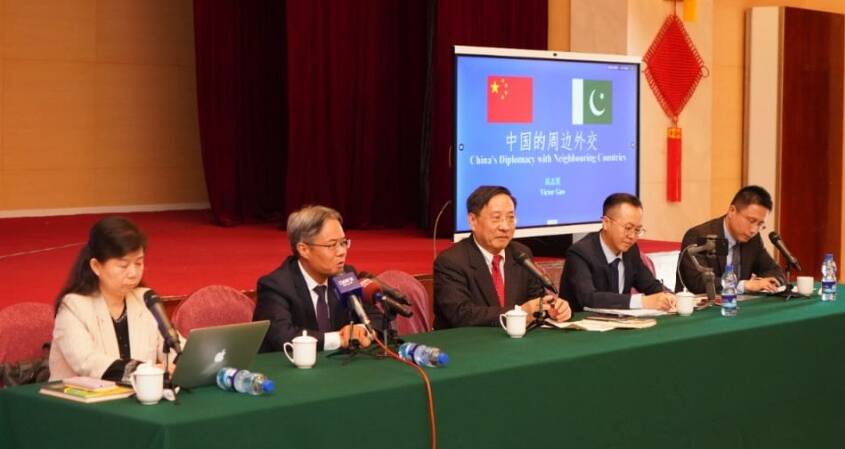Chinese Ambassador stresses next decade vision for CPEC, shifts focus to 21st century economy
China’s envoy to Pakistan, Jiang Zaidong, underscored the importance of consolidating the China-Pakistan Economic Corridor (CPEC) and proposed increased collaboration in agriculture and mining to address Islamabad’s financial challenges. Emphasizing a vision for the next decade that prioritizes the 21st-century economy over traditional infrastructure models, Zaidong outlined three key points: consolidating the current CPEC phase, deepening cooperation in agriculture and mining, and enhancing livelihoods through impactful projects. The ambassador highlighted specific projects and called for substantial investment in human capital to implement President Xi Jinping’s vision of upgraded corridors. However, Chinese scholar Viktor Gao urged Pakistan to shift focus from traditional infrastructure projects to embrace the digital era, cautioning that without swift action, the country could fall behind.
China’s envoy to Pakistan, Jiang Zaidong, on Monday emphasised the consolidation of the China-Pakistan Economic Corridor (CPEC) and again offered cooperation in the agriculture and mining sectors, aiming to alleviate Islamabad’s financial woes.
Zaidong articulated his country’s vision for the next decade under CPEC. This vision focuses more on the 21st century’s economy rather than the brick-and-mortar model cherished by Islamabad. The ambassador spoke moments before the introspective speech by Chinese scholar Viktor Gao, who urged Islamabad not to perceive CPEC only through the lens of infrastructure and energy projects.
The Chinese ambassador outlined three key points for future cooperation: the consolidation of the current phase of CPEC, deepening cooperation in agriculture and mining, and improving people’s livelihoods through small but impactful projects.
Ambassador Zaidong highlighted the need for consolidation, stressing the completion of projects like the Mainline-I and KCR (Karachi Circular Railway). The ambassador did not mention any road projects.
During the visit of interim Prime Minister Anwaarul Haq Kakar, both countries signed an addendum to the Mainline-I project of CPEC, reducing its scope and design to a cost one-third less than $6.7 billion.
Pakistan and China signed an agreement for mineral sector development and industrial cooperation under CPEC, aiming to facilitate in-depth cooperation in the fields of geology, mineral resources investigation, evaluation and development, mineral product development, processing, trade, and investment promotion.
The ambassador highlighted agriculture and mining sectors for deepening cooperation, stating, “Pakistan faces economic challenges and financial difficulties, and we can help transform its resources advantage into a capital advantage.”
Regarding the third point, the ambassador stated that people’s livelihoods can be improved through small but strategic projects. He cited examples such as the Gwadar water desalination plant, Gwadar Friendship Hospital, and the provision of 3,000 solar panels in Balochistan as means of improving people’s lives.
The ambassador mentioned President Xi Jinping’s proposal of eight major steps at the last Belt and Road Forum that provide opportunities for future cooperation among other countries. He added that China is on the path of modernisation for the prosperity of all the common people.
Zaidong expressed China’s intention to bring more opportunities to other countries, particularly for their all-weather strategic partner. He highlighted CPEC’s role in resolving Pakistan’s energy shortages, noting the $25.4 billion invested in the flagship project of the Belt and Road Initiative (BRI).
The ambassador conveyed President Xi’s vision of an upgraded version of CPEC, revolving around five corridors: the growth corridor, people’s livelihood corridor, innovation corridor, green corridor, and open-up of all corridors. He stressed the need for substantial investment in human capital by Pakistan to implement these corridors.
Viktor Gao, the Vice President of the Beijing-based Centre for China and Globalisation, set the tone for future Pakistan-China relations. Gao stressed that development is the only way to eradicate poverty, emphasising peace and stability as prerequisites for progress.
Gao advised Pakistan to shift focus from infrastructure and energy projects under CPEC to the emerging digital era. He added that, “CPEC is traditionally focused on infrastructure, basic manufacturing, and energy projects, but as the world advances into a new digital era, Pakistan needs to integrate data, artificial intelligence, and algorithms.”
Gao highlighted the necessity to think beyond the traditional view of CPEC and advocated for CPEC 2.0, emphasising the importance of the digital era. He cautioned that Pakistan might be left behind if swift action is not taken.
However, despite Chinese advice, Pakistani policymakers seem solely focused on obtaining more road projects from China rather than leveraging Chinese technological developments.
Gao also addressed US-Pakistan relations and US-China relations, suggesting that Pakistan need not choose between these countries but should align itself with the country that best serves its interests.
Chinese envoy Zhao Shiren urges students to uphold integrity and strengthen China-Pakistan ties
LAHORE:The Consul Generals from several countries and other distinguished guests attended …











